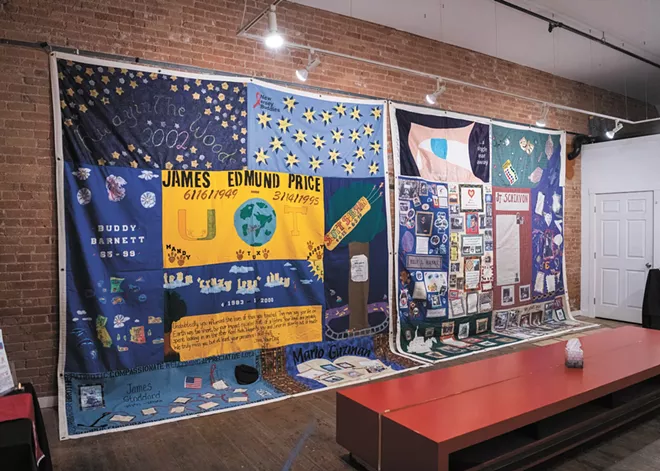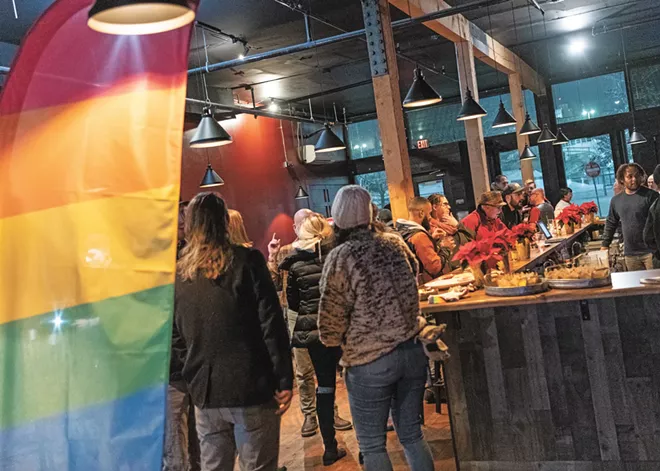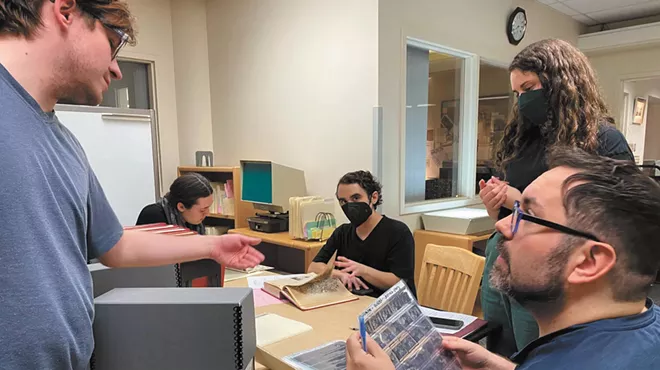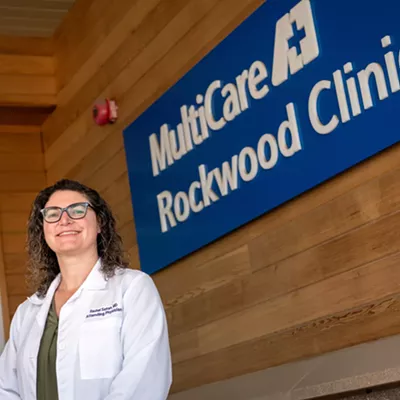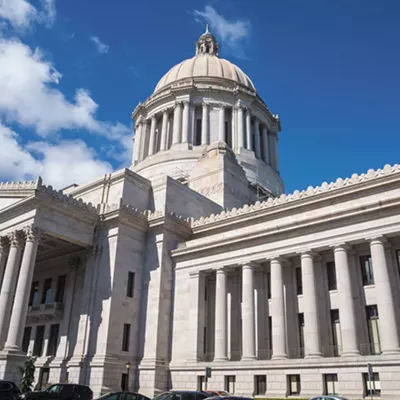
Four squares of the AIDS Memorial Quilt hang from ceiling to floor in a small gallery connected to Spokane's newest queer bar, the Q Lounge. Benches in the center of the room allow visitors a moment to sit and confront their grief as they take in each intricate detail and each enduring memory of lives cut far too short by HIV/AIDS.
Each square consists of several handmade panels sewn in honor of those dead. Each panel is about 3 feet by 6 feet — roughly the size of a coffin.
Despite the muffled chatter in the adjoining bar, the silence in this room is deafening.
For the past few years SAN (formerly Spokane AIDS Network) has been hosting a couple of these memorial quilt squares to commemorate World AIDS Day, which occurs every Dec. 1. This year, all four squares on display had some tie to the Inland Northwest, according to Grant Ogren, SAN's executive director.
"[These quilts] are such a huge part in remembering our history," Ogren says. "They really do just stop you in your tracks."
This year, one of the quilts on display even contains a panel that SAN Board President Dale Briese made to honor his late partner.
However, instead of just the annual somber commemoration of World AIDS Day, this year's event was brightened with the announcement that for the first time in about seven years, SAN will receive state funding once again.
This means that instead of solely being an organization to raise awareness and fight stigma, SAN will be able to provide the services it once did.
"For the first time since I became the executive director in 2019, I won't be the only employee of SAN," Ogren laughs.
For now, Ogren says they're getting back to the basics. For SAN, this means hiring peer navigators who will be fairly similar to the medical case managers SAN used to employ, just without providing medical treatment.
"They'll work directly with folks living with HIV/AIDS and provide them with the support they need," Ogren says. "This could mean taking them to a doctor's appointment or just making sure they have food to eat or a bus pass to get around."
Folks looking for clinical services will continue to receive them from the Spokane Regional Health District, according to Ogren. With the funding they'll receive, Ogren says SAN will be able to hire three or four peer navigators, two of whom were introduced at the Dec. 1 celebration.
"I have this permanent grin on my face. I'm so excited to grow and rebuild to what we once were," Ogren says. "I absolutely love my job, which is something I've never been able to say before."

"Rare Cancer Seen in 41 Homosexuals," The New York Times proclaimed on July 3, 1981.
That headline introduced Americans to a new epidemic, but the first known case of AIDS in Spokane County wasn't recorded until 1984, three years after the first U.S. cases were recorded. A year later, a group of friends, medical caregivers and concerned citizens here informally established what was then called the Spokane AIDS Network.
SAN's early work focused on end-of-life care and safe-sex practices. As time passed, however, advancements in drug treatments meant that the virus was no longer a death sentence, and that allowed SAN to widen its focus. For the next 20 years, the organization was able to host events like the Spokane AIDS Walk and the annual Oscar Night Gala, which was rebranded as the Red Ribbon Gala in 2015.
By 2016, SAN employed about 20 professionals and more than 50 volunteers working throughout the region in Spokane, Wenatchee, Tri-Cities, Moses Lake and Walla Walla. They were able to provide HIV medical case management to more than 200 people in 16 counties on Washington's east side.
That fall, SAN's state Department of Health funding contract was not renewed, and the organization was forced to cut its HIV care and prevention services. This left SAN scrambling as it tried to figure out how to continue.
By March 2017, all of its clients transitioned to the Spokane Regional Health District to continue their care.
SAN's board decided to renew the organization's 501(c)(3) nonprofit status so it could continue to make an impact on the six-county area it serves, but the damage was already done.
"When we closed our doors and had folks solely going to Spokane Regional Health District, it became this very clinical process," Ogren says. "These people were just going to their doctors and no one else."
"A lot of our clients became very secluded after that," he continues.
That's why he hopes, as the organization builds itself back up, that it can begin providing temporary housing services to its clients. This would allow SAN to build a community where folks feel they belong, but are also closer to the services they need. With its new funding starting in January, SAN is still ironing out some details.
By creating this community, instead of just finding folks places to live throughout the city, Ogren says they'll be able to better ensure their safety and comfort.
"Most of the legwork is done already, we just need to secure the funding and find the land," he says. "Once that's secure it's just a process that will take a few years to complete."
But until then, Ogren and his new team of employees will be working steadily as they build SAN to what it once was. ♦

